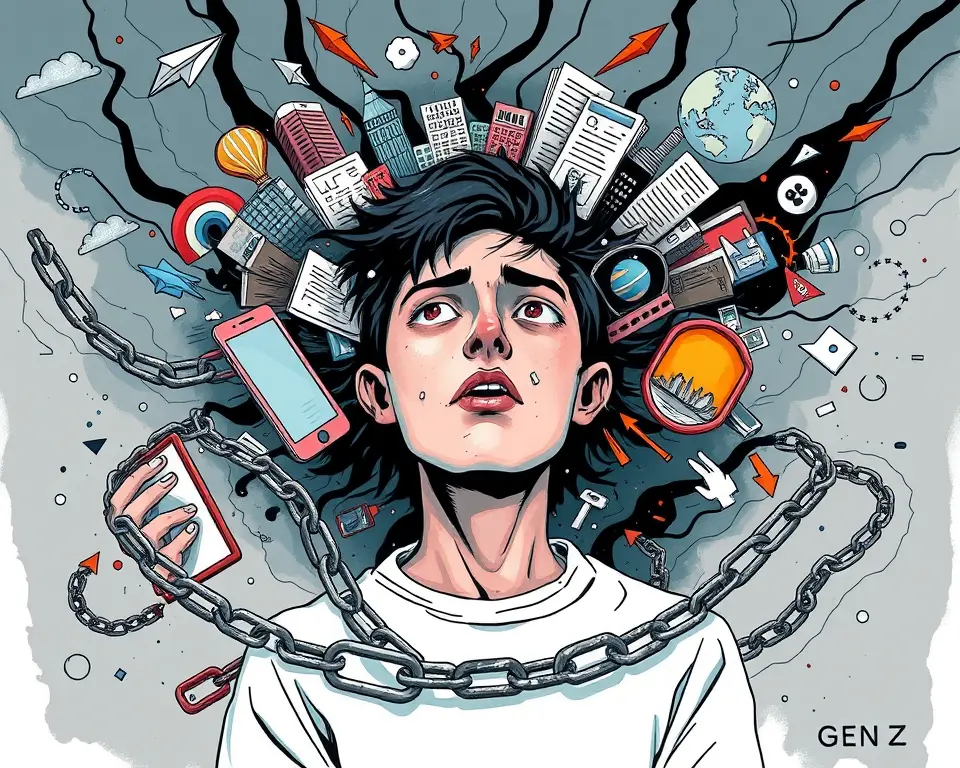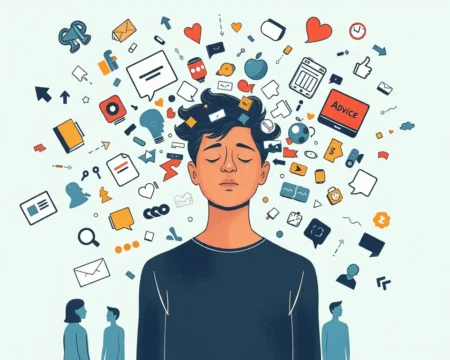Generation Z, born between 1997 and 2012, is stepping into adulthood amidst a whirlwind of economic uncertainty, social media pressures, and global anxieties. Often portrayed as tech-savvy and resilient, a closer look reveals a generation grappling with a unique set of challenges that contribute to a pervasive sense of unease. This article unpacks the key factors driving Gen Z’s struggles, offering insights into the chart of their quarter-life crisis.
The Mental Health Maze
Gen Z is often called the “most anxious generation,” and statistics back this claim. According to the Walton Family Foundation, 42% of Gen Z struggle with depression and hopelessness, nearly double the rate of Americans over 25 (23%). Harmony Healthcare IT reports that 61% have been medically diagnosed with an anxiety condition.
Social Media’s Double-Edged Sword
Growing up in the digital age, Gen Z is intimately connected to social media. While these platforms offer avenues for self-expression and connection, they also fuel a constant comparison game. Studies show an inverse relationship between screen time and psychological well-being, with higher utilization associated with poorer well-being.
- Fear of Missing Out (FOMO): Social media can trigger FOMO and poor body image, contributing to negative mental health impacts.
- Cyberbullying and Online Harassment: These digital stressors disproportionately affect Gen Z, exacerbating mental health challenges.
- Addiction and Disconnect: Social media addiction puts Gen Z at risk of mental health disorders, with 53% affected and 58% experiencing pressure and comparison. Many find it difficult to disconnect, with 44% saying it’s “quite difficult” and 18% “very difficult” to quit social media.
Academic and Career Pressures
The pressure to succeed academically and professionally weighs heavily on Gen Z. A 2022 report indicated that 86% of respondents listed academic anxiety as a primary stress source, with 76% experiencing it in the past six months.
- Rising Tuition and Debt: Skyrocketing tuition fees lead to substantial student loan debt, delaying major life milestones.
- Job Market Realities: Gen Z faces a challenging job market with limited openings and rising costs. Many feel stuck, with 80% in white-collar roles finding it difficult to find better prospects.
- Economic Uncertainty: Concerns about unemployment and affordable living contribute to feelings of being overwhelmed.
Global Issues and Existential Threats
Gen Z has grown up witnessing global crises like climate change, mass shootings, and political instability, leading to heightened anxiety and depression.
- Climate Anxiety: A recent study found that over 80% of young people are worried about the climate crisis, expressing feelings of sadness, anxiety, anger, and powerlessness.
- Gun Violence: More than two in five (42%) Gen Z young adults say gun violence negatively affects their mental health, with 70% seeing it as a public health issue.
- Sense of Purpose: A significant percentage of Gen Z (43% to 49%) “do not feel what they do each day is interesting, important or motivating,” impacting their overall happiness.
Financial Fears: A Looming Crisis
Gen Z faces significant financial challenges, with rising debt, increasing living costs, and job market uncertainties. A Talker Research poll for Newsweek revealed that Gen Z carries the highest average personal debt at $94,101, far exceeding millennials ($59,181) and Gen X ($53,255).
Debt Burden
Gen Z’s debt problems stem from a combination of factors:
- Student Loan Burdens: Rising student loan burdens contribute to Gen Z’s debt, delaying major financial milestones.
- Credit Card Debt: Many rely on credit cards to cover everyday expenses, leading to growing balances and costly interest payments.
- Lack of Financial Literacy: Without proper financial education, Gen Z struggles to manage debt and make informed financial decisions.
Cost of Living Crunch
The escalating cost of living significantly impacts Gen Z’s financial well-being.
- Inflation and Basic Living Costs: A United Way study found that 69% of Gen Z adults cite inflation and the cost of living as their top financial concerns.
- Housing Affordability: Homeownership is increasingly difficult, with the median age of first-time buyers reaching 38 years, up from the late 20s in the 1980s.
- Limited Savings: Gen Z spends nearly twice their savings, driven by rising living costs and changing spending habits.
Job Market Challenges
The current job market presents unique obstacles for Gen Z.
- Frozen Job Market: Limited job openings and rising costs contribute to financial strain for young workers.
- Unemployment Rates: The unemployment rate for those aged 20 to 24 climbed to 8.3% in early 2024, a sharp increase from its low in April 2023.
- Hiring Priorities: Companies prioritize experienced workers over younger candidates, hindering Gen Z’s early career opportunities.
Relationships and Social Disconnect
Despite being hyper-connected digitally, Gen Z often experiences feelings of loneliness and isolation.
- Loneliness: More than two in five (44%) Gen Z young adults feel like they don’t matter to others, and one in three (34%) report loneliness.
- Lack of Support: About one in three Gen Zers do not often feel loved (31%) or supported (35%) by others, and a similar share (30%) always/often feel like nobody knows them well.
- Changing Relationship Patterns: Young adults grapple with uncertainty about their future, financial insecurities, and feelings of isolation and loneliness due to changes in dating and relationship patterns.
A Glimmer of Hope
Despite these challenges, Gen Z demonstrates resilience and a willingness to address their struggles.
- Mental Health Awareness: Gen Z is breaking down stigmas and reshaping perceptions about therapy, more likely to acknowledge their mental health struggles and seek professional help.
- Proactive Approach: A significant percentage of Gen Z individuals regularly engage in therapy and have received professional mental health services.
- Prioritizing Wellness: Gen Z prioritizes mental health as their top concern, with 28 percent ranking it above physical health.
Navigating the Future: Strategies for Gen Z
To navigate these challenges, Gen Z can adopt several strategies:
- Mindful Social Media Use: Limit screen time, curate social media feeds to promote positive content, and prioritize real-life interactions.
- Financial Literacy: Seek financial education to manage debt, save effectively, and make informed investment decisions.
- Career Planning: Develop skills, seek mentorship, and explore diverse career paths to navigate the evolving job market.
- Self-Care and Mental Well-being: Prioritize mental health by practicing mindfulness, engaging in physical activity, and seeking professional support when needed.
- Building Connections: Cultivate meaningful relationships, engage in community activities, and seek support from friends and family.
Business and Policy Implications
Addressing Gen Z’s struggles requires a multi-faceted approach from businesses and policymakers:
- Workplace Mental Health Support: Employers should prioritize mental health and well-being by offering resources, flexible work arrangements, and supportive work environments.
- Financial Literacy Programs: Provide access to financial education and resources to help Gen Z manage debt, save, and invest wisely.
- Affordable Education: Advocate for policies that reduce the cost of higher education and alleviate student debt burdens.
- Social Support Systems: Invest in community programs and mental health services to provide support and resources for young adults.
Conclusion: Charting a Course for a Better Future
While the chart of Gen Z’s struggles paints a concerning picture, it also highlights their resilience and willingness to seek solutions. By understanding the unique challenges they face and adopting proactive strategies, Gen Z can navigate the complexities of adulthood and chart a course toward a brighter, more fulfilling future. It is crucial for businesses, policymakers, and society to support this generation in overcoming their struggles and harnessing their potential to create a better world.










